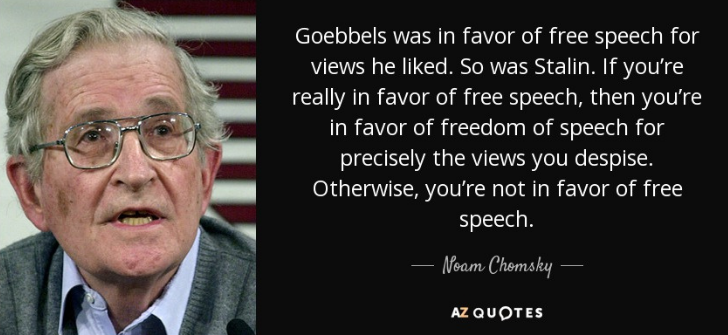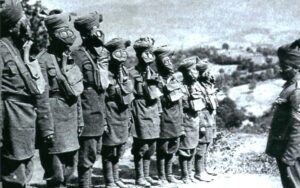On an ordinary day some time in 2004, Noam Chomsky was scheduled to give an interview. He entered what looked like a classroom; a large bookshelf clung to the side of the wall, next to an expansive and out of place blackboard. In the middle lay two bare wooden chairs, positioned inwards to create forced proximity. Chomsky was used to this kind of set up. Many of his days were filled attending to interview and speech requests from academics, universities, think tanks, students and non-profits from all over the world. Lending his time and insight to those dedicated to “very serious things” was a core belief of his and what he believed to be his civic duty.
So when a gold-tracksuited Sacha Baron Cohen swaggered in under the pretence of his fictional alter ego Ali G, Chomsky was understandably perplexed. He knew something was wrong, and received instant confirmation by Cohen’s introduction: “I am with my main man, Professor Noman Chomsky.” He nodded with mild bemusement at his new name before proceeding to answer the onslaught of grammatically criminal questions. Cohen’s satirical ambush grew increasingly bizarre — at one point, Cohen demanded that Chomsky distinguish between the words bilingual and bisexual — but Chomsky’s responses remained balanced and thoughtful, delivered in his trademark calm and mellow tone. He even fist bumped Ali G with an awkward laugh at the end of the interview — but not without requesting his assistant, Beverly ‘Bev’ Stohl, “no more men in gold suits.”
Chomsky is a no-frills, stand-up guy who takes himself seriously. Much like his aversion to gold suits, Chomsky resists the idea of being ostentatious or special. He doesn’t want to be “a little bit more plain”, and if it were up to him, “he wouldn’t even want to eat”. This ethos of discipline, devotion and minimalism underpins his lifetime of achievement as a linguist and his larger-than-life personality as a political intellectual.
As a world-renowned linguist, Chomsky’s academic success stems from his basic interest in human beings. To him, the human ability to articulate thought into language distinguishes us from all our evolutionary siblings and goes to the core of what makes us human. This idea enthralled Chomsky throughout his postgraduate studies at Harvard and his years teaching at the Massachusetts Institute of Technology (MIT) in 1957. To his pleasant surprise, and good romantic fortune, he was not the only one interested in the acquisition of language. Rather, his late wife, Carol, had been working on the foundations of what were to become modern linguistics.
Together, along with a couple of graduates at Harvard, they experimented with the ruling data-driven doctrine of structuralism at the time. In what he describes as an “open lab”, MIT gave him the creative license to explore the rejection of established theories, such as the behavioural theory of language. This held that humans acquired language through processes of stimulus and response, penalty and reward, reinforcement of rewarding processes and the association of ideas. Chomsky’s breakthrough contribution flipped this on its head: he argued language should be treated as a biological organ. Like the visual or immune system, Chomsky maintained we were genetically predetermined to language, and that all humans have a basic structure to acquire language irrespective of their intelligence or their environment.
When asked to square this academic pursuit with his political work critiquing neoliberalism, Chomsky gives his own account, “I was deeply involved in political work long before I ever heard of linguistics.” For him, it started off as background noise in his childhood, until it later crystallised into his intellectual interests. For others, like the late Bryan Magee, there was a deeper connection between the two dualities, which started with Chomsky’s rejection of empiricism in linguistics. While departing from the existing scientific method of rationalisation in the acquisition of language, Magee suggests Chomsky also subconsciously rejected liberalism; the sibling that grew up in the history of European thought alongside empiricism.
For Chomsky, neoliberalism has proved to be the root of all problems for the global Left. Analogising the UK Labour Party and the U.S. Democratic Party as fundamentally two sides of the same coin, their biggest problem, Chomsky argues, has been the divide of loyalties between constituents and party interests. Labour’s problems crucially began under the neoliberal years of Blair, who Chomsky dubs as “Thatcher-lite”. Blairite forces enabled growing worker insecurity, arms-length relationships between employers and employees and low inflation coupled with high profits – the perfect cocktail for our corporate-led Gig economy. In his view, the divide between the hard-left socialist wing and the Blairite neoliberal wing of the Labour Party was not inevitable but manufactured. For Chomsky, there are several divides that all interact – political, cultural, religious, open or closed, Brexit or Remain – but “the fundamental divide is the class divide”.

Noam Chomsky at MIT, 1969. Credits: RV1864 / Flickr
Across the Atlantic, the Democrats have struggled with a similar ailment since the Carter years in the late ’70s. Chomsky argues the Democrats conceded any remaining interest in the working class — their traditional voter base — in place of the upper crust intelligentsia on Wall Street. The Humphrey-Hawkins Full Employment Act was the last pro-labour legislation that was pushed through Congress but ruthlessly watered down until it was “toothless” in ensuring full employment. Instead, the Democrats became enamoured with their new meritocratic creed and the partygoers in Hollywood. Obama’s victory was a potent illustration of this continuing tension: while he was elected by activists and grass-roots organisers, mostly the young, within two years he had “betrayed” his constituents and created the basis for Trump. The “Obama mistake” was reflected in the labour vote that Democrats had lost as a result of stabbing their people in the back: “It wasn’t that Republicans had won, it was that the Democrats had lost,” Chomsky claims.
If neoliberalism is Chomsky’s diagnosis for a dysfunctional Left, what is his prescription? Far from a radical call to revolution, his solution lies in an alternative model of regimented capitalism. This entails serious government control of the excesses of capitalism, worker-owned enterprises, German-style worker representation on corporate management boards, a carbon tax that reinvests revenue in the public sector, as well as universal healthcare that taxes higher but saves on insurance premiums. In other words, a return to the ‘50s-60s style of social democracy that was the “golden age of modern capitalism.” To achieve this, Chomsky sets out three tests for the Left to get their act together: “educational, organisational and activist”.
In his view, rebuilding democracy is one of the three crises of our times. To Chomsky, freedom under the neoliberal model enables the subordination of ordinary citizens to concentrated, unaccountable and private power. Now, corporations dominate the decision-making sphere. When Margaret Thatcher quipped that “there is no society, only individuals” — inspired by Milton Friedman — she was referring to the intentional and institutional weakening of institutions of governance that allowed people to participate in decision-making. In this vein, it is easy for Chomsky to square the blame for the erosion of our centrist institutions, the appeal of populist figures and the decline of the British health service with the normalisation of neoliberalism in mainstream politics. It is much harder to picture what an open, plural and, crucially successful democracy could look like.
In response to this hypothetical, Chomsky hardly hesitates. To him, the core principles of anarchism are fundamental to a successful democracy. Put plainly, Chomsky maintains a structure of dominance can only be justified if it is legitimate. Rather than presuming legitimacy, every authority must satisfy a burden of proof. Wherever it cannot be justified, the hierarchical structure should be dismantled over time. When asked about the practicalities of this, Chomsky’s idealism peeks through, “you can’t do it by snapping your fingers… But I think that ideal is virtually universal within our moral system.”
Elsewhere, Chomsky proves to be a pragmatic political strategist. Recognising the futility of a Marxist approach, he carefully chooses his words. He openly admits to the importance of terminology in politics – and in general persuasive discourse. What works well in other countries, he says, will not have the same domestic appeal. For instance, the success of a Christian-Democrat ticket launched on socialism in Germany has no bearing in the U.S., or the UK — as demonstrated in December 2019. (Note: Chomsky signed a letter endorsing Jeremy Corbyn in the 2019 election). Equally, socially progressive slogans like “defund the police” birthed from the Black Lives Matter movement harm the Left. Chomsky puts this bluntly: “defund the police was a gift to the right wing,” at the expense of a meaningful message. His view also has a deeper implication: the political Left must come up with a way to repackage their ideas and values to an electorate. If framed under the right terminology, Chomsky firmly believes socialist ideas about redistribution, taxation and worker’s representation can resonate to a wider audience and succeed in the ballot box.
Chomsky’s flirtation with anarchism took root much earlier on in his life. He was born to Jewish immigrants in what he describes as a “Jewish cultural ghetto” in Pennsylvania. Influenced by his father, a Hebrew scholar, Chomsky grew up reading Hebrew literature about the pre-state Jewish settlement in Israel. His interest grew into activism as a member of the socialist radical wing of the Zionist youth movement that favoured Arab-Jewish class cooperation and opposed a Jewish state. Chomsky, a life-long critic of Zionism, now states the movement would be labelled as anti-Zionist.
The rest of his extended family were mostly unemployed or working class; making a living as shop boys, seamstresses or street vendors. They were, however, the fortunate ones: it was not uncommon for neighbours to sell rags door to door in order to put food on the table in the aftermath of the Depression. Although his family lacked the privilege of formal education, Chomsky takes pride in the fact they were self-educated. His uncle was paradigmatic of this – a working class man who donned a newsstand on 72nd Avenue — and welcomed heated debate from angsty New Yorkers who stopped to read the daily headlines.
Chomsky loved to spend the summers there, frequently visiting his relatives for lengthy periods of time. To fill his days in the sweltering urban heat, he sought refuge in the nearby bookstores set up by the diaspora of emigres (many of whom were Spanish). This habit influenced his early intellectual interest in the Spanish civil war and the formal anarchist movement; a movement whose principles Chomsky already aligned with and would later characterise the rest of his life. This later manifested in his opposition to the Vietnam and Iraq wars, and earned his title as a “public dissident” against American imperialism.
His years of dissent, it turned out, did not take long. “Well the 1950s were a pretty quiescent period. And then by around 1960, things were changing.” While the Vietnam war was in full force, Americans were not paying attention. Protest was “virtually zero”, but you could find Chomsky in a church delivering talks (not sermons) to all but four attendees, one of which included “some drunk who walked in off the streets.” Gradually, the atrocities of the bombings gained traction – leading to the first day of international protest in October 1965 – and eventually a march in Boston. Still, Chomsky was embarrassed at the level of understatement, “…we were criticizing mostly the bombing of North Vietnam, because that was at least an issue that somebody would listen to,” Chomsky said. “But that was a side show. I mean, the worst attack was against South Vietnam.”
The My Lai massacre against South Vietnamese civilians soon made headlines. When Chomsky was asked to write about it for the New York Post, he agreed on the condition he was able to speak about the other unspoken, post-Tet village raids that were engineered by “the guy sitting in the air-conditioned office[s]” rather than a “half-educated, poor G.I”. In the end, for Chomsky, “My Lai was literally a footnote” among the other mass murder operations that were delicately not discussed.
By contrast, the Iraq war triggered international protests from the outset. This – to Chomsky – made all the difference. “The U.S. could not use the tactics [of chemical warfare] used in Vietnam,” and public opposition forced the Bush administration to retreat on its war aims. From allowing elections to foregoing their desired conditions in the Status of Force Agreement, the U.S. were pushed into a corner with their hands up. Naturally an optimist, Chomsky reminds us “Iraq is a horror story, but it could have been a lot worse.”
Now at the age of 92, the pandemic has relegated his public appearances to the discretion of the webcam positioned opposite his mahogany library. Sporting an extensive, grey beard and a tuft of new facial hair spilling over his gentle frame, Chomsky turns his focus to the two remaining existential projects: the climate crisis and the threat of nuclear war. He has given an unprecedented number of interviews over the past year alone, of which he describes as “a moment of confluence of severe crises,” – most importantly of which is human self-destruction. “Since the Second World War, we have created two means of destruction,” Chomsky begins. “Since the neoliberal era, we have dismantled the way of handling them. That’s our pincers. That’s what we face, and if that problem isn’t solved, we’re done with.”

Chomsky at the Vancouver Peace Rally, 2004. Credits: Duncan Rawlinson / Flickr
Without climate action, every other issue is moot. When I asked him how the year of 2020 will shape the next five to ten years, he told me “that depends on whether humans are capable of the sharp reversal of course needed to address the severe crises.” Chomsky argues with a new, sharper sense of urgency that humans only have a decade — or two — to decisively deal with the crisis. One solution may lie in changing the terms of the social contract that governs the relationship among citizens and between them and governments. He isn’t the first to consider the case for a new social contract: “the social contract is likely to change, but I suspect for more powerful reasons [than a complete digital shift], like impending environmental catastrophe”, he told New Politic.
The threat of nuclear destruction, an equally dire prospect, follows suit. Using the inching Doomsday Clock as a metric, Chomsky urges the collective action of an informed, engaged public to act as a buffer against nuclear war, “…it started seven minutes to midnight. By 1953 it had moved to two minutes to midnight. That was the year when the United States and Soviet Union exploded hydrogen bombs. Immediately after the Trump election late January this year, the clock was moved again to two and a half minutes to midnight, the closest it’s been since ’53.” Problematically, the advancement of artificial intelligence and fully automated technology increase this risk of cataclysm. While Chomsky is nuanced when it comes to AI — he believes technology is value-neutral and can be used to liberate, or oppress, depending on our choices — he caveats his response to me, “bear in mind that AI, while sometimes useful, is dumb.”
To the world, to his supporters and critics both, Noam Chomsky has proved to be a formidable voice. He draws diverse crowds of all colours, ages and walks of life and, according to Bev, some even shed tears when they see him. For many, he represents freedom: a walking symbol of the fight for democracy and freedom. It’s not hard to understand his global and personal appeal; one only needs to meet his gaze. The trademark Chomsky sparkle in his eyes produces an illuminating effect on his old frame, counterbalanced only by the quiet fierceness of his logic, evidence and articulation when making his case. He unflinchingly challenges interviewers and audience members alike, his razor-sharp mind steamrolled by the reserves of information stored away in his neural filing cabinet. “[Noam] only has to open draws and buffers in his head and literally pick up a file and immediately access recollections of conversations he was having fifty years ago.”
Yet, it is his unexpected calm demeanour that makes him so mysterious; shielding his playful side as a loving grandfather who is “enchanted by the magic of childhood”. His inner playfulness is what keeps him afloat in the midst of the world’s darkness and above the oppression he has witnessed, according to Bev. It helps him be Noam – who Bev says, is “just about the truth”.
For Chomsky, it has never been about the interactions with prime ministers or presidents, but about the forgotten prisoners and the idealistic fourteen year-olds who write him earnest letters of gratitude and seek his advice. The “regular people” has always been his reason why. Even now, when asked how he remains optimistic, he looks to others who are committed to fighting for a more just world and asks, “how can you not share in their optimism, with the load of our privileges and advantages?” Other times, he inspires audiences with the Gramsci idiom, “pessimism of the intellect, optimism of the will.” Chomsky’s unwavering optimism remains a part of his lasting legacy and one of his most striking traits. While admitting our generation will be the first (and could be the last) to shoulder the responsibility of two existential questions, the inner intellectual admires the challenge. In the end, he says, it comes down to this: “will the human experiment exist in any recognisable form?”


